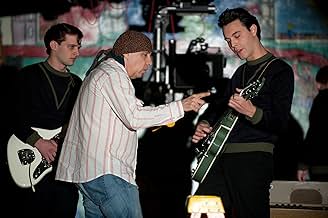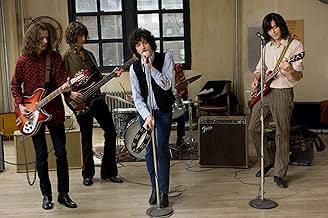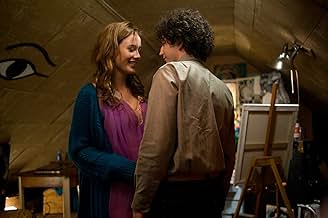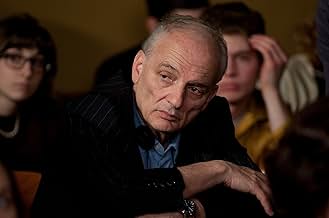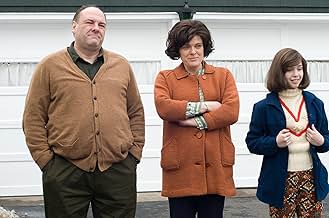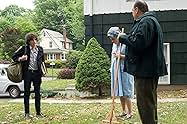IMDb RATING
6.0/10
5.1K
YOUR RATING
Set in suburban New Jersey in the 1960s, a group of friends form a rock band and try to make it big.Set in suburban New Jersey in the 1960s, a group of friends form a rock band and try to make it big.Set in suburban New Jersey in the 1960s, a group of friends form a rock band and try to make it big.
- Awards
- 3 wins & 3 nominations total
Christopher Bannow
- Dave Smith
- (as Chris Bannow)
- Director
- Writer
- All cast & crew
- Production, box office & more at IMDbPro
Featured reviews
Reading some of the other reviews I can somewhat see positive interpretations of this movie: life as a young person in the 60s was not cohesive or predictable thus it is fitting for this film to be "confused". The problem is that the more or less random snapshots of the particular life we are witnessing illustrate the decade in ways we already understand: I like the Beatles, I am sad and mad when MLK is shot, I don't want to go to 'Nam.
Without the support of a plot or structured character development, one can anticipate the emptiness of it all. Too many threads are planted at once and they all die in strangled, choppy mess. Finally, individual scenes are executed in a way that is flowery, verbose, and predictable, which leaves each self-indulgent attempt at emotion-evoking very obvious.
Nostalgia is strong, and a few shivers-down-the-spine moments will no doubt come, which makes it easy to overrate this film. However those moments happen *despite* the film: cool history and good music are powerful things.
Without the support of a plot or structured character development, one can anticipate the emptiness of it all. Too many threads are planted at once and they all die in strangled, choppy mess. Finally, individual scenes are executed in a way that is flowery, verbose, and predictable, which leaves each self-indulgent attempt at emotion-evoking very obvious.
Nostalgia is strong, and a few shivers-down-the-spine moments will no doubt come, which makes it easy to overrate this film. However those moments happen *despite* the film: cool history and good music are powerful things.
As with most filmmakers who work in themes, you should watch this to see Chase's perspective on the material, not for the story itself. Its seemingly formless structure will throw off some viewers, but it's very much in line with his body of work, being less about the music and the era and more about the effects of the passage of time, specifically the tug of the past on the present and the evolution of character (or not) as the years go by. It's an autobiographical elaboration on the themes in the dark and sad final seasons of the Sopranos, though it does have plenty of the usual witty Chase touches as well, like the kids dancing away the JFK retrospective. There's a pervasive sense of nostalgia because the setting feels realistic, neither idealistic like a Spielberg/Lucas movie nor revisionist like the progressive Pleasantville-type movies whose intention is to show us all how the past wasn't as enlightened as today. The downside is that it's such a well-covered period and milieu (for my generation The Wonder Years is the reference point) that it's hard to find something original to say. But go in with the understanding that it's more complex than it appears and it'll give you plenty to chew on afterward. At one point the lead and his girlfriend are watching Blow-Up and he comments on how strange it is there's no music to tell you when someone's going to get killed, and she replies that the sound of the wind in the trees is the music, which sums up this movie pretty well.
David Chase's earnest mix of rock 'n roll, young love and family drama is overlong and sloppy, aspiring to be a defining examination of the Sixties but rendered trite by trudging out references to every historic moment (in this, it's similar to "Lee Daniels' The Butler") and wallowing in misguided pronouncements about the Vietnam War, capitalism and rock's purity; the intent is to advance the father-son conflict between lead John Magaro and a wasted James Gandolfini. (In fact, Chase unintentionally portrays rock music as a negative force, divisive enough to destroy families.) Chase's strength as the creator of "The Sopranos" was in his carefully plotted backstory that forced the viewer to pay close attention upfront; here, he employs a similar approach, but without the expanse a mini-series affords the result is disjointed and incomplete: all of the stories he introduces are either left unsatisfactorily unresolved or spontaneously concluded. It doesn't help that his characters are inherently unlikable (Magaro is a good example), mere caricatures (co-stars Jack Huston and Will Brill) or blanks (love interest Bella Heathcote). The film's sole asset is Steven Van Zandt's musical curation, though he eschews the deeper tracks in favor of songs even the casual fan will recognize.
Not Fade Away takes me back to the Sixties when I would have been of the age that the young people of the film are in. Certainly the music was nostalgic enough and that will satisfy any number of fans.
James Gandolfini who starred as that other New Jersey legend of more recent vintage, Tony Soprano stars here as the father of aspiring musician John Magaro who wants more than anything else to succeed in Rock and Roll as those new groups from Great Britain are doing, The Beatles and The Rolling Stones. He and friends from his suburban New Jersey want to become rock stars only there's a lot more work involved than originally thought.
As for dad, Gandolfini doesn't like the kid's views or the new mod style of dress that his son is now taking up. He's a typical blue collar guy who has some real concerns about the family business and some even bigger concerns for his health. The two clash and their clash is what drives Not Fade Away.
I remember some kids on my block who were growing up including my next door neighbor in Brooklyn were doing exactly what Magaro and his friends were doing. None of them as I know stuck with music, but all apparently led successful lives, at least I've heard nothing different.
The music is wonderful if Sixties rock is your taste this is your film. The plot however is nothing that we haven't seen before. And Not Fade Away is hampered by a lack of character development other than Gandolfini and Magaro. But these two may be worth a look and a listen.
James Gandolfini who starred as that other New Jersey legend of more recent vintage, Tony Soprano stars here as the father of aspiring musician John Magaro who wants more than anything else to succeed in Rock and Roll as those new groups from Great Britain are doing, The Beatles and The Rolling Stones. He and friends from his suburban New Jersey want to become rock stars only there's a lot more work involved than originally thought.
As for dad, Gandolfini doesn't like the kid's views or the new mod style of dress that his son is now taking up. He's a typical blue collar guy who has some real concerns about the family business and some even bigger concerns for his health. The two clash and their clash is what drives Not Fade Away.
I remember some kids on my block who were growing up including my next door neighbor in Brooklyn were doing exactly what Magaro and his friends were doing. None of them as I know stuck with music, but all apparently led successful lives, at least I've heard nothing different.
The music is wonderful if Sixties rock is your taste this is your film. The plot however is nothing that we haven't seen before. And Not Fade Away is hampered by a lack of character development other than Gandolfini and Magaro. But these two may be worth a look and a listen.
David Chase's anticipated Not Fade Away not only jumbles itself into an indulgent story, constantly keeping the audience at an arm's length but it's overly stretched and uneven not utilizing the strong talents in the film like James Gandolfini, Jack Huston, and John Magaro. A natural comparison to Almost Famous (2000), the film doesn't hold a candle to Cameron Crowe's homage to music. Showcasing outstanding music of the 1960′s and 1970′s, Chase manages to capture moments of the young adolescent mind longing to be more. Lead Magaro delivers a character transformation of mind and body, a turn that elevates the film considerably. The great Jack Huston, an actor that will likely be one of the biggest things in Hollywood any minute now, delivers an aggressive supporting turn reminiscent of Channing Tatum's work in A Guide to Recognizing Your Saints (2006). Bella Heathcote shows tenderness and promise but undervalued and virtually unused. James Gandolfini, stands out with charisma and garners much of the big laughs. A great character actor like Gandolfini should be given room to move. The film ultimately fails because it never feels like Chase knows his film or where he wants it to go. The last twenty minutes feel unneeded, unearned, and thrown together for an "artistic" catalyst with no emotional or technical effect whatsoever. A large disappointment.
Did you know
- TriviaMost feature films slot 1-2 percent of production costs for the music budget, but in "Fade', music supervisor Steven Van Zandt, had about 10% of the $20-million-plus budget or at least $2 million.
- GoofsNobody said "elementary school" in North Jersey, at least not those days. Grades 1-6 (or 1-8 if you went to Catholic school) was called "grammar school."
- ConnectionsFeatures Pacifique Sud (1958)
- SoundtracksPeppermint Twist
Written by Joey Dee and Henry Glover
Performed by Joey Dee and The Starliters
Courtesy of Rhino Entertainment Company
By arrangement with Warner Music Group Film & TV Licensing
- How long is Not Fade Away?Powered by Alexa
Details
Box office
- Budget
- $20,000,000 (estimated)
- Gross US & Canada
- $610,792
- Opening weekend US & Canada
- $19,182
- Dec 23, 2012
- Gross worldwide
- $636,399
- Runtime
- 1h 57m(117 min)
- Color
- Sound mix
- Aspect ratio
- 1.85 : 1
Contribute to this page
Suggest an edit or add missing content




